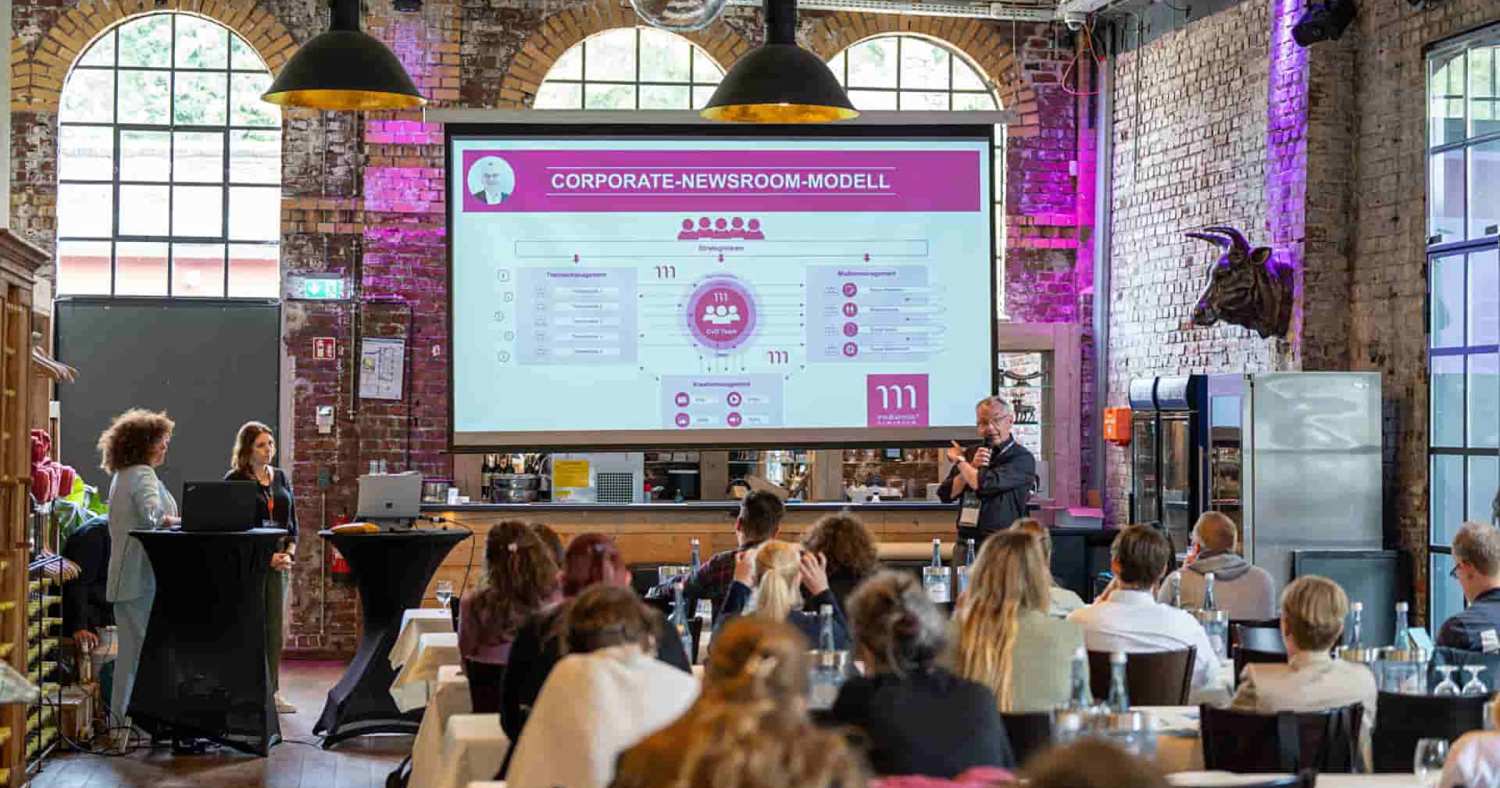How is the role of communicators changing in times of digitalization, transformation and growing complexity? What strategic importance does communication have today - and what does this mean in concrete terms for those responsible for communication?
Communication professionals must increasingly act as business enablers in order to sharpen their strategic expertise - target group orientation, technological competence and entrepreneurial thinking are required. In the latest episode of the thinkBEYOND podcast, a format of the SCM - School for Communication and Management on internal communication, technology and transformation, Maximilian Miguletz, Director Strategic Communications at Scompler, shows which skills will be crucial in the future, how communication can have a greater impact both internally and externally and which companies are already practising integrated, strategically oriented communication.
In an interview with Carmen Jahn, Maximilian explains the current change in corporate communications: instead of ad-hoc content on strategically irrelevant topics, communicators increasingly want to take on a co-designing role and make a targeted contribution to the implementation of corporate strategy.
The shift towards strategically oriented, integrated communication is not only changing processes and topics, but also the demands placed on the people who shape them.

As Director Strategic Communications, Maximilian Miguletz is responsible for Scompler's communications strategy.
What challenges and concerns do you currently perceive in the professional field of communication?
Maximilian Miguletz: "There are studies that say that these phenomena - information overload, confusion, uncertainty - also cause communicators to leave their job and change industries. I think one way out of this is to define your own role differently and to think more ambitiously. The solution is to see yourself as a strategic consultant within the company or within your own construct.
Whether in start-ups, SMEs or corporations - conversations with communicators from a wide range of industries clearly show that although many communicators formulate the strategic role as a goal, the operational noise overshadows it in everyday life."
What does it mean in concrete terms to think more strategically about your own role?
"If you talk about yourself as a business enabler, you really have to understand the business. This is precisely the hurdle that many communication departments still face: There is a lack of real engagement with the business model and corporate goals - simply because this was often not necessary in the past.
Strategic communication begins with a deep understanding: How does our company work? What are our goals? Do we want to sell, change, convince? If you can't answer these questions clearly, you won't be able to develop a sound communication strategy - either internally or externally."
Skills that communicators need today
1. business understanding
Communicators need to understand the corporate strategy and be able to clearly identify interrelationships so that they can develop their communication strategy on this basis.
2. focusing
What do we communicate - and what not? Communicators must examine topics for their strategic relevance and prioritize them clearly.
3. technological expertise
We should not only be familiar with technological platforms such as Scompler , but also use them in a targeted manner to make communication measurable, plannable and strategic.
4. attitude
Communicators need clear guidelines and a purpose according to which they act and communicate.
What do internal communicators need to pay special attention to if they want to make this role change?
"A sustainable approach to internal communication requires that it is no longer seen as a mere implementation entity - but as a strategic partner. The shift towards this role has already begun: Internal communication today contributes measurably to the implementation of corporate strategy, conveys values, builds trust and participates in change processes. It is now crucial that this role is recognized within the company - through clear mandates, genuine freedom and the trust of the management level.
At the same time, communicators themselves are in demand: they must actively accept this role, make it visible and also demand it. It's not just about naming strategic relevance, but proving it with operational effectiveness. Those who plan communication instead of just reacting create orientation - and noticeably advance the company."
"Internal communication must stop being internal content marketing. It's not about clicks, but about trust, clarity and impact."
Maximilian Miguletz, Director Strategic Communications
"We also recently published the white paper "Topic-centricity in internal communication" on this topic. This is about how internal communication not only understands the corporate strategy, but actively helps to shape it - and how it is anchored in the company via a clear topic architecture and communicated according to the one-voice principle. The aim is to focus strategically instead of getting lost in operational details."
The four pillars of efficient internal communication
These four concepts are interrelated - those who plan strategically, work collaboratively and implement them efficiently at the same time create effective communication.
Strategic topic planning
Targeting communication:
Which topics contribute to the strategy - and which do not? A clear topic architecture creates focus and relevance.
One-voice principle
Define consistent messages and communicate coherently across departments and channels.
Collaboration
Breaking down silos - coordinating communication processes with internal and external communication and relevant stakeholders and promoting collaboration.

Content Operations
Producing and distributing content efficiently: with clear processes, suitable technology and defined responsibilities.
How can technology help to structure day-to-day work in internal communication and achieve greater impact at the same time?
"It is negligent not to rely on technological possibilities to improve and change what you do. Technology is the biggest lever for this. Nevertheless, you shouldn't think that technology will do everything for you and that everything will work by itself. Technology is also not an end in itself, but should help with a specific process.
That's why Scompler is also a platform for strategic communication management. Making a strategy derived from the corporate strategy understandable in communication and making it suitable for everyday use - a platform like Scompler is perfect for this. In Scompler , the strategy does not get lost, but you always have it with you, in the topic conference and in every single communication measure.
A good example is the DHL Group. Around 140 employees from the Employee Communications, Media Relations and Social Media departments work with Scompler - across four continents, in different disciplines, but based on common themes. This creates transparency, synergies and efficiency in communications work."
What Maximilian Miguletz also talks about:
The conversation with Maximilian Miguletz is personal and honest: What challenges do communicators really face in their day-to-day work? What helps to break out of the operational hamster wheel? And why does good communication sometimes just bring peace and quiet? Plus: the role of AI in everyday working life - and the courage to say no sometimes.






